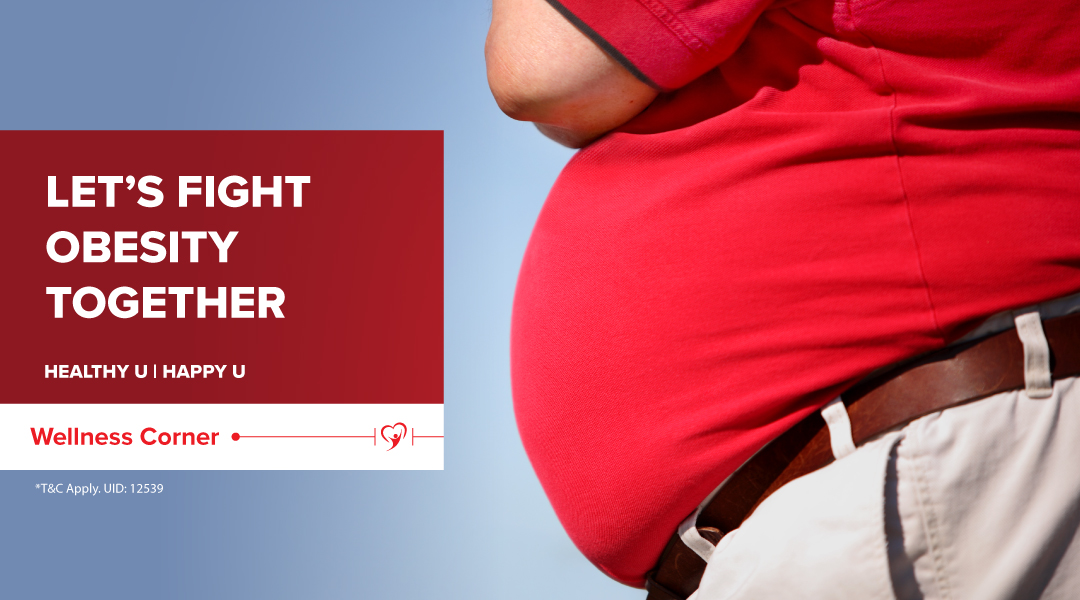

Obesity & Overweight – What Do They Mean?
Overview
When excessive amounts of fat accumulate in the body, it results in obesity. When the body gets obese or overweight, the size and amount of fat cells in the body increases. It is always better to check your body fat percentage and waist circumference to keep obesity in control. Body mass index (BMI) is a simple weight-for-height index used to determine overweight and obesity in adults.
According to World Health Organisation (WHO), BMI greater than or equal to 25 is considered as overweight, while BMI greater than or equal to 30 indicates obesity. Obesity conditions can be improved or even avoided with some proper exercise plan and diet.
Causes of Obesity
Obesity condition often results from following a sedentary lifestyle over the years which generally includes improper diet, insufficient hours of sleep, lack of exercise and many more. A balance between calorie intake and energy expenditure also plays a vital role in causing obesity because if you eat more than you burn, the body will store those excess calories as fat. Hence it is necessary to exercise regularly to burn out these extra calories.
Obesity can be caused by:
- Overeating: Always keep a check on the portion control of your meal. Even healthy food comes along with a specific calorie count; eating it excessively can also lead to an increase in your daily required calorie intake. Apart from this, food high in fat should mostly be avoided, as epidemiologic studies prove that diets high in fat contribute to weight gain.
- Genetics: A person is more likely to develop obesity if one or both parents are obese. Genetics also affect hormones that lead to leptin deficiency. Leptin is a hormone that controls weight by signalling the brain to eat less when body fat stores are too high.
- Increased Intake of Energy-Dense Foods: When you excessively eat energy-dense foods high in fat and sugar, it increases the blood glucose level. This results in insulin production due to a spike in blood glucose level, which promotes the growth of fat tissue.
- Stress: Due to stress, most people indulge in excessive eating. Stress increases the secretion of a hormone known as cortisol in the bloodstream. High blood levels of cortisol are linked to an increase in appetite. Hence stress can also make the person obese.
- Diseases:Obesity can also result from hypothyroidism, insulin resistance, polycystic ovary syndrome and cushing's syndrome.
Health Effects of Obesity
Adults and children who have overweight or obese, compared to those with healthy weight, are at increased risk of developing serious diseases and health conditions. These are
Obesity in Adults
- Stroke
- Type 2 Diabetes
- Gastroesophageal Reflux Diseases (GERD)
- High blood pressure
- Increased risk of a heart attack
Adults who are obese have higher chances of developing severe health problems which can affect the brain, blood vessels, gallbladder, bones, heart, liver and joints. Excessive accumulation of fats in adults can lead to
In addition, obese women can have severe complications during pregnancy.
Obesity in Children
Obesity in children can significantly impact their physical and psychological health. As per a study published in the National Center for Biotechnology Information (NCBI), childhood obesity can adversely affect children's physical health, emotional well-being and self-esteem. It is also associated with poor academic performance.
Centers for Disease Control and Prevention (CDC) states that children who have obesity are more likely to develop:
- High blood pressure
- High cholesterol
- Asthma
- Fatty liver disease
- Type-2 diabetes
- Heartburn
Symptoms of Obesity
Symptoms are common among people with obesity.
Obesity Symptoms in Adults
Common symptoms of obesity in adults include:
- Excess body fat, particularly around the waist.
- Shortness of breath.
- Sweating more than usual which gives rise to skin problems.
- Snoring.
- Difficulty in sleeping.
- Difficulty in performing simple physical tasks.
- Fatigue & tiredness ranging from mild to extreme.
- Pain, especially in back and joints.
- Psychological issues such as negative self-esteem, depression, shame, and social isolation.
Obesity Symptoms in Children
Common childhood obesity symptoms may include:
- Fatty tissue deposits which may be noticeable in the breast area.
- Stretch marks on hips and back.
- Dark velvety skin around the neck and other areas, referred to as Acanthosis nigricans.
- Shortness of breath on performing physical activity.
- Sleep apnea, which is a sleep disorder characterised by loud snoring & episodes of stop breathing.
- Constipation.
- Low self-esteem.
- Early puberty in biological females & delayed puberty in biological males.
Prevent Being Overweight
Preventing yourself from being overweight or preventing obesity isn't as tricky as you might thing. All it takes is a lot of dedication and consistency. Here are some of the most effective ways to tackle the issue
- Eat heavy breakfast: This is important as it provides a satiating effect. You don't feel hungry for most of the day and it also prevents you from binging eating unhealthy food. But please ensure that you eat a healthy breakfast or else the entire purpose is defeated.
- Exercise regularly: Exercising helps you burn calories which is the most vital aspect of a weight loss plan. Even if you consume high amounts of calories, exercising regularly can help keep your weight under control.
- Weigh yourself regularly: If you have weight loss plan, checking weight regularly can help to know if you are close to your goal or not. This also helps to calculate your dietary and workout efficacy.
- Count Calories: Weight gain is directly related to the calories consumed, so it is best to keep a check on daily calorie intake.
- Consume filling-foods: Eating a well-balanced diet high in fibre food, nuts and eggs help to stay fuller for longer time. They reduce your appetite as they have a satiating effect. This will prevent you from snacking on unhealthy food.
- Get enough sleep: Getting restful and adequate sleep can help control your food cravings and thereby control weight gain as it releases hormones that keep your appetite under control.
- Limited consumption of processed food: Processed foods have become common and an integral part of our daily diet as the food is not only tasty but it is also easily available and affordable. But, these foods are refined, contain harmful ingredients and lack an essential amount of nutrients. And adding on, they are also high in calories.
- Limit sugar intake: Sugar offers no nutritional benefit and elevated sugar levels leads to weight gain. So, one must limit sugar consumption and chooser healthier alternatives.
- Manage stress: Stress triggers brain response that affects eating patterns and leads to cravings for high-calorie foods.
Conclusion
Obesity can diminish the overall quality of life and can have a serious impact on health. Carrying extra kilos can lead to serious health consequences such as cardiovascular disease (mainly heart disease and stroke), type 2 diabetes, musculoskeletal disorders like osteoarthritis, and some cancers. Fortunaytely, overweight and obesity are largely preventable by achieving an energy balance between calories consumed on one hand, and calories used on the other hand.
Source: Mayo Clinic, WHO, verywellhealth, cdc.gov
Get a right Health Insurance today & protect your savings from unexpected medical expenses.
Obesity is a global epidemic which can lead to serious health complications like cardiovascular disease, type 2 diabetes, cancer and more. Such conditions can necessitate hospitalisation, where medical bills can exhaust your savings. So, get medical insurance if you fall under such a risk category to be financially secure during a medical emergency.
Disclaimer: This blog provides general information and discussions about health and related subjects. The information and other content provided in this blog, website or in any linked materials are not intended and should not be considered, or used as a substitute for, medical advice, diagnosis or treatment. Kindly contact your Doctor before starting a new medicine or health regime.

/diabetes_s.jpg?sfvrsn=27944770_2)
/cholesterol-s.png?sfvrsn=2cb77395_2)
/myocardial-infarction-s.jpg?sfvrsn=c30af9c0_2)
/cancer-w.png?sfvrsn=b00ce94_2)
/obesity_s.jpg?sfvrsn=41f27b41_2)












 Health Insurance
Health Insurance  Travel Insurance
Travel Insurance  Car Insurance
Car Insurance  Cyber Insurance
Cyber Insurance  Critical Illness Insurance
Critical Illness Insurance
 Pet Insurance
Pet Insurance
 Bike/Two Wheeler Insurance
Bike/Two Wheeler Insurance  Home Insurance
Home Insurance  Third Party Vehicle Ins.
Third Party Vehicle Ins.  Tractor Insurance
Tractor Insurance  Goods Carrying Vehicle Ins.
Goods Carrying Vehicle Ins.  Passenger Carrying Vehicle Ins.
Passenger Carrying Vehicle Ins.  Compulsory Personal Accident Insurance
Compulsory Personal Accident Insurance  Travel Insurance
Travel Insurance  Rural
Rural 










